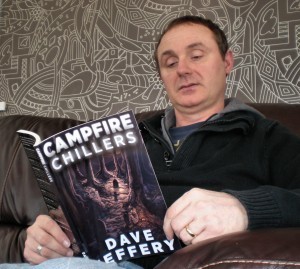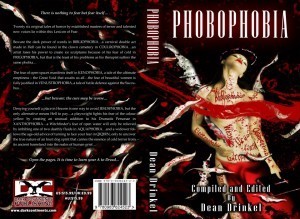“What do you fear?” Wednesday welcomes Dave Jeffery
Today, I welcome Dave Jeffery, author of the best-selling Necropolis Rising, to tell us about what he fears the most.
1. Your story in the Phobophobia anthology is about Frigophobia – fear of cold. What was the original inspiration for this or were there a number of sources that you drew upon?
The idea for frigophobia came from a chance revisit to the movie Groundhog Day when Bill Murray is carving ice sculptures. I’ve always been fascinated with the talent it requires to work in unconventional mediums; clearly the skill and precision of such a talent takes exceptional dedication to the craft. I thought about this as I watched the movie, just how many Groundhog Days it would take for Murray’s character to perfect the art. Then I though about what would happen if you lost the ability to do that; what could make that happen? If you became afraid of the very medium in which you worked? From here, the roots of the story took hold.
2. What do you fear? Tell me about your own phobias.
I have always been terrified by the thought of decapitation. This originated from reading William Peter Blatty’s Legion (at an age I really shouldn’t have) when the Gemini killer is talking about how a severed head can see for a period of time after it has been removed from the body. I have goose bumps as I recall this. So thanks!
3. Dr Tiernay is a psychiatrist but she is also a wounded individual – mental health carers and professionals often bear their own scars, why did you decide to make this a part of the character’s persona?
The best carers are those who have been through the experience. They have a level of empathy that those who look in can never quite understand. It made sense to have Tiernay as one who is expert through experience. This is what makes her such a specialist. She is someone who Swanson is more likely to seek out in order to find an effective resolution to his phobia.
4. Bobby Swanson suffers from the ultimate artist’s nightmare – being unable to create, having an accident kill his vital connection with his craft – is this a fear you suffer from? What do you think it would be like to not only no longer write but also to lose the joy of doing so?
I think this is pertinent to any artist working in any medium. I have written elsewhere that artistic will is innate for some people, it cannot be turned off. I often think of those who are crippled with strokes and how they must feel, trapped in a body that doesn’t work. Are they screaming out at a world that just isn’t able to hear them?
5. You reference Mary Shelley’s Frankenstein in the story, do you think people do create their own monsters? Much was made, when Frankenstein was adapted as a stage-play, out of the relationship between the Creator and the Monster – each being seen as a mirror of certain hidden aspects of the other.
The brain is a powerful, and mostly uncharted, organ. More often than not the impact of experience creates potentially more damage than organic disease. It’s how we cope with the psychological assault than determines if our mind becomes maligned. A damaged mind is, after all, a place for monsters to grow. How we tether them is the important issue.
6. Tell me more about your collection, Campfire Chillers, where did the stories come from and were you conscious of going back to the roots of the genre i.e. the scary story told by firelight to make us jump at the shadows?
I have always been a lover of genre short stories and TV shows like the Twilight Zone, Outer Limits and Armchair Theatre. I guess the real inspiration for Campfire Chillers came from the movie Creepshow where you had a selection of grisly tales with a sinister figure introducing the tales. In Campfire Chillers this is the Scoutmaster, and we have an introduction to each story, a kind of morality tale in itself, in order to establish the theme. This is very Twilight Zone of course but I couldn’t resist it. There are thirteen tales ranging from ghost, paranormal and just in your face horror. I wanted to bring the idea of the traditional campfire story up to date but infuse it with the books, TV shows and movies of my youth. The book is now long-listed for the 2012 Edge Hill Prize and sort of confirms that it has, in some part, worked as a collection.
7. Your novel, Necropolis Rising, has been widely praised. Where did the original idea for it come from and what do you think it is about the zombie that is striking a chord with the horror audience at the moment?
I have wanted to write a zombie novel for many years. I’m a huge fan of the genre and recall watching movies such as Dawn of the Dead and Zombie Flesh Eaters in my early teens on my dad’s VHS recorder when he was asleep. By the time I’d accrued the impetuous and the skills to write something legible, I found that the zombie genre wasn’t moving on as such. Whilst I enjoy the apocalyptic elements of the genre, it had literally been done to death. I made a decision that I wouldn’t write the book until I had a premise that looked at the genre from another angle. A few years ago I came up with the concept that the zombies should be more an obstacle than a blatant threat and wrote a story based around this premise. It seemed to work and has been well received by the staunch zombie community and those new to the genre.
8. On a more sombre note, your novel, Finding Jericho, discusses and faces the realities of growing up with mental illness in the modern world. What was the motivation behind writing this work? What did you hope to achieve?
I have worked in mental healthcare for 28 years this month. The motivation for writing Finding Jericho was simple: to raise awareness of its impact upon the person and their family. The book is about dealing with the stigma of mental illness, told through Jon who has to deal with his uncle’s illness. Jon represents the hope that a well informed society will change its perceptions of what is and isn’t madness. The book is testament to the sufferers and survivors I have had the honour to meet during my career.
9. Tell me about one of the other stories in Phobophobia that you enjoyed and why?
Jesusophobia by William Meikle. I love the pace and how Meikle balances dry wit and dread with consummate ease.
10. So what does 2012 hold for Dave Jeffery? Any last words?
Wow, 2012. A lot of things are in the pipeline. Firstly, Finding Jericho is being re-issued through Hidden Thoughts Press in April/May. I have short stories appearing in publications by Wicked East Press, Hersham Horror Books and Stumar Press. I am currently halfway through the sequel to Necropolis Rising for Dark Continents Publishing and have received the green light from pulp icon Guy N Smith to co-author the seventh book in the Night of the Crabs franchise. Busy, busy as they say. But, hell, it beats working for a living, right?
Phobophobia is available at the following links:
[image error]
Campfire Chillers on Kindle UK
Campfire Chillers on Kindle US
[image error]
Necropolis Rising on Kindle UK
Necropolis Rising on Kindle US
Author Website
Publisher of Finding Jericho:
Tweet





